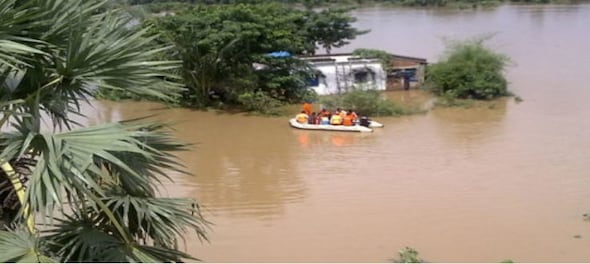
India may face devastating climate change effects, including killer heat waves and severe flooding, in the next 80 years, says a study that calls for urgent steps to reduce greenhouse gas emissions to avert associated risks to the country's population, ecosystems and economy.
Annual mean temperatures across India are likely to increase by 4.2 degrees Celsius under a high emission scenario by the end of the 21st century, the researchers, led by Prof Mansour Almazroui from the King Abdulaziz University in Saudi Arabia, said.
India is the most densely populated region in the world, with relatively high sensitivity and low resilience to changes in its climate, all of which makes it very exposed and vulnerable to any changes that may occur during the rest of the 21st century, Almazroui told PTI in an email on World Environment Day on Friday.
"A large part of India's population, ecosystems, and economy are all exposed to high risk in the face of future climate change, he said.
The study, published in the journal Earth Systems and Environment last month, suggests that northwestern India is at particularly high risk to flooding from snow and glacier melt caused by temperatures projected to rise by the end of the 21st century.
The researchers also forecast killer heat waves over the plains, adding that severe flooding is likely to take place with annual rainfall over India projected to increase under all emission scenarios in the 21st century.
Using a supercomputer to analyse global climate models, the research team observed a potentially large increase of more than 6 degrees Celsius under a high emission scenario over northwestern India, comprising the complex Karakorum and Himalayan mountain ranges.
The enhanced warming is likely to further accelerate the snow and glacier melt over this region, with a consequent increase in flooding. This could have serious implications for crops, ecosystems, and populations living downstream, Almazroui said.
Moreover, the rise in temperature is likely to increase the frequency of killer heat waves over the country's plains, he added.
The study analysed the latest generation of models to project more warming -- 1 to 3 degrees Celsius -- over the irrigated plains of the Ganges, which according to the researchers, may have serious repercussions for agriculture and livelihoods.
The models project higher warming over the Indian subcontinent in the winter season than in the summer, which may disrupt snow or ice accumulations and affect winter cropping patterns, the researchers said.
While the projected rise in the average temperature in winter is up to 4.7 degrees Celsius, the estimated warming for summers is up to 3.6 degrees Celsius, they said.
The study also projected a higher increase in rainfall over northwestern India, including Gujarat and Rajasthan, while the winter rainfall also shows a larger increase over Gujarat and adjacent states under all future scenarios.
Under the high emission scenario, the summer monsoon rainfall averaged over India, particularly in the western side of the country that expands to Western Ghats and Kerala, is projected to increase by the end of the 21st century, the researchers said.
The increase in summer rainfall, together with increased water in rivers due to glacier melt in summer, may cause severe summer flooding in the future, they said.
Check out our in-depth Market Coverage, Business News & get real-time Stock Market Updates on CNBC-TV18. Also, Watch our channels CNBC-TV18, CNBC Awaaz and CNBC Bajar Live on-the-go!


Exclusive: FM Nirmala Sitharaman says poverty alleviation can't be achieved by throwing money at the problem
Apr 18, 2024 7:27 PM
Tamil Nadu Lok Sabha elections 2024: List of Congress candidates
Apr 18, 2024 4:33 PM
Will the payment under PM-KISAN be increased? Here's what Finance Minister said
Apr 18, 2024 3:58 PM

